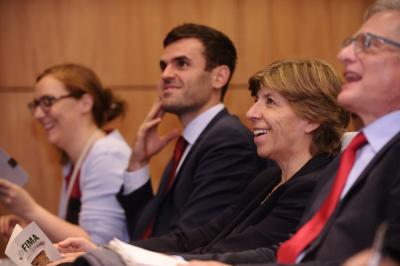COP21 crucial in fight against climate change

ROME - As the 2015 Paris Climate Conference (COP21) this December inches closer, the words of President Barack Obama ring clear: “We are the first generation to feel the impact of climate change, and the last generation that can do something about it.”
A press conference held by the French Embassy in anticipation of December’s COP21 summit, welcomed various speakers, from Italian environmental scientists to COP21 negotiators, to underline the aims, background and importance of the Paris conference. The French Ambassador Catherine Colonna, in her opening speech, rendered COP21, "our last opportunity to act."
The COP21 will, for the first time in over 20 years of annual UN negotiations, aim to achieve a legally binding and universal agreement on the climate, with the key aim of keeping global warming below 2°C. If this legally binding agreement comes to pass, this conference might well be a turning point in the fight against global warming.
France will play a leading international role in hosting the COP21, with the conference expected to be the largest international conference ever held in the country. It is estimated that the conference will attract around 50,000 participants, with around 25,000 official delegates from government, international organisations, UN agencies, NGOs and civil society.
An international political response to climate change began at the Rio Earth Summit back in 1992, with the subsequent ‘Rio Convention’ including the adoption of the UN Framework Convention on Climate Change (the UNFCCC). This framework was aimed at stabilising atmospheric concentrations of greenhouse gases and to avoid “dangerous anthropogenic interference with the climate system”. The UNFCCC now has a near-universal membership of 195 parties. These Conference of Parties (COP) therefore, aim to review this Convention’s implementation.
This year, the aforementioned crucial aim of no more than 2°C temperature rise, comes as an Intergovernmental Panel on Climate Change (IPCC) report, pointed to an alarming trajectory to a warming of between 3 °C to 5 °C, if nothing changes.
The conference faces many difficulties, however, and it is difficult to envisage how a deal will be struck between these 195 countries. Such was the case in Copenhagen, where they aimed to strike an international environmental deal, but no overall agreement could be made. One of the main difficulties is that developing countries perceive the climate issue as an obstacle to their development, and economically cannot justify the adoption of such an agreement.
Many argue that the only way to adapt a policy at an international level in favour of the fight against climate change would be to fund poorer counties. The European Commission has made the statement that, “if these financial answers do not emerge, there will be no agreement in Paris."
This considered, another key objective of the COP21 is the mobilisation of $100 billion per year by developed countries from 2020 onwards. This figure should then help developing countries to adapt to the impacts of climate change and reduce their emissions. More generally, many hope that the COP21 will be able to incentivise economic stakeholders to redirect their investments to then launch the transition to low-carbon economies.
However, the information gleaned at the COP21 press conference was not all bad news, leading Italian researcher Valerio Rossi Albertini highlighting that over 70% of Italy’s glass is now recycled. He also reminded the audience that Italy is the country where geothermal energy was first harnessed for industrial purposes, and is still one of the main producers of geothermal electric energy.
From 2008 onwards there has also been a veritable boom in Italy in terms of renewable energies, with hydraulic energy leading the way.
If Italy survived in June 2013 for two hours on just renewable energy, this is a good indicator of the progress that can still be made in the reduction of fossil fuel usage, Valerio Rossi Albertini highlighted. Later on, Demark’s goal of being “fossil free” by 2050 was lauded at the meeting.
The conference highlighted that whilst the COP21 was extremely important for fight against climate change, progress has been made globally. They noted for example that whilst energy-related carbon dioxide emissions flatlined worldwide in 2014, the world economy grew.


